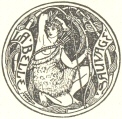Transcribed from the 1891 Cassell and Company edition by DavidPrice,
CASSELL’S NATIONAL LIBRARY.
LIVES
OF THE
English Poets
Prior Congreve Blackmore Pope
BY
SAMUEL JOHNSON, LL.D.
CASSELL & COMPANY. Limited:
LONDON, PARIS &MELBOURNE.
1891.
INTRODUCTION.
When, at the age of sixty-eight,Johnson was writing these “Lives of the EnglishPoets,” he had caused omissions to be made from the poemsof Rochester, and was asked whether he would allow the printersto give all the verse of Prior. Boswell quoted a censure byLord Hailes of “those impure tales which will be theeternal opprobrium of their ingenious author.” Johnson replied, “Sir, Lord Hailes has forgot. Thereis nothing in Prior that will excite to lewdness;” and whenBoswell further urged, he put his questionings aside, and added,“No, sir, Prior is a lady’s book. No lady isashamed to have it standing in her library.” Johnsondistinguished strongly, as every wise man does, between offenceagainst convention, and offence against morality.
In Congreve’s plays he recognised the wit but condemnedthe morals, and in the case of Blackmore the regard for thereligious purpose of Blackmore’s poem on “TheCreation” gave to Johnson, as to Addison, an undue sense ofits literary value.
With his “Life of Pope,” which occupies more thantwo-thirds of this volume, Johnson took especial pains. “He wrote it,” says Boswell, “‘conamore,’ both from the early possession which thatwriter had taken of his mind, and from the pleasure which he musthave felt in for ever silencing all attempts to lessen hispoetical fame. . . . I remember once to have heard Johnson say,‘Sir, a thousand years may elapse before there shall appearanother man with a power of versification equal to that ofPope.’”
Pope’s laurel, since Johnson’s days, hasflourished, without showing a dead bough, for all the frosts ofhostile criticism.
H. M.
PRIOR.
Matthew Prior is one of those thathave burst out from an obscure original to great eminence. He was born July 21, 1664, according to some, at Wimborne, inDorsetshire, of I know not what parents; others say that he wasthe son of a joiner of London: he was perhaps willing enough toleave his birth unsettled, in hope, like Don Quixote, that thehistorian of his actions might find him some illustriousalliance. He is supposed to have fallen, by hisfather’s death, into the hands of his uncle, a vintner nearCharing Cross, who sent him for some time to Dr. Busby, atWestminster; but, not intending to give him any education beyondthat of the school, took him, when he was well advanced inliterature, to his own house, where the Earl of Dorset,celebrated for patronage of genius, found him by chance, asBurnet relates, reading Horace, and was so well pleased with hisproficiency, that he undertook the care and cost of hisacadem
